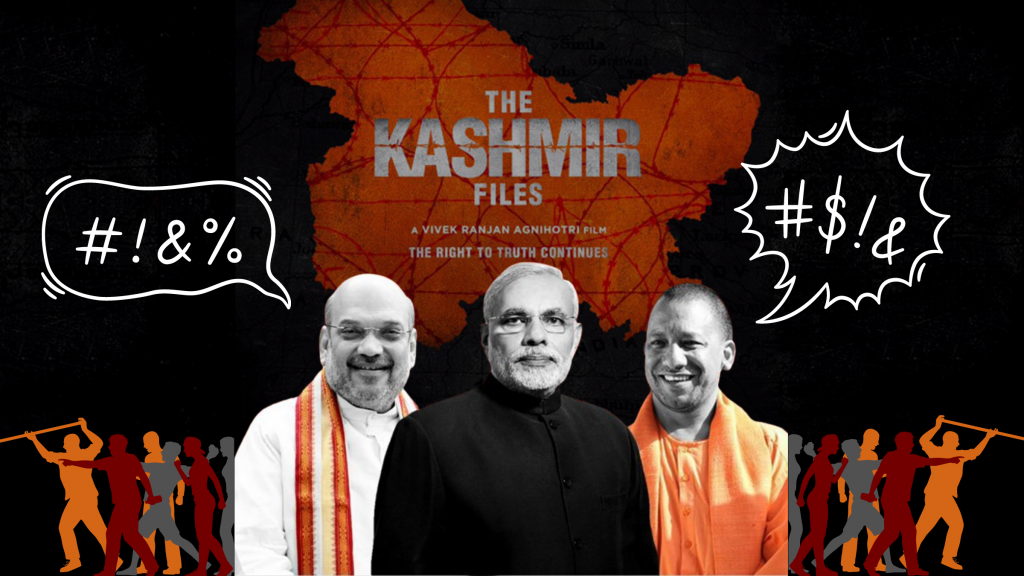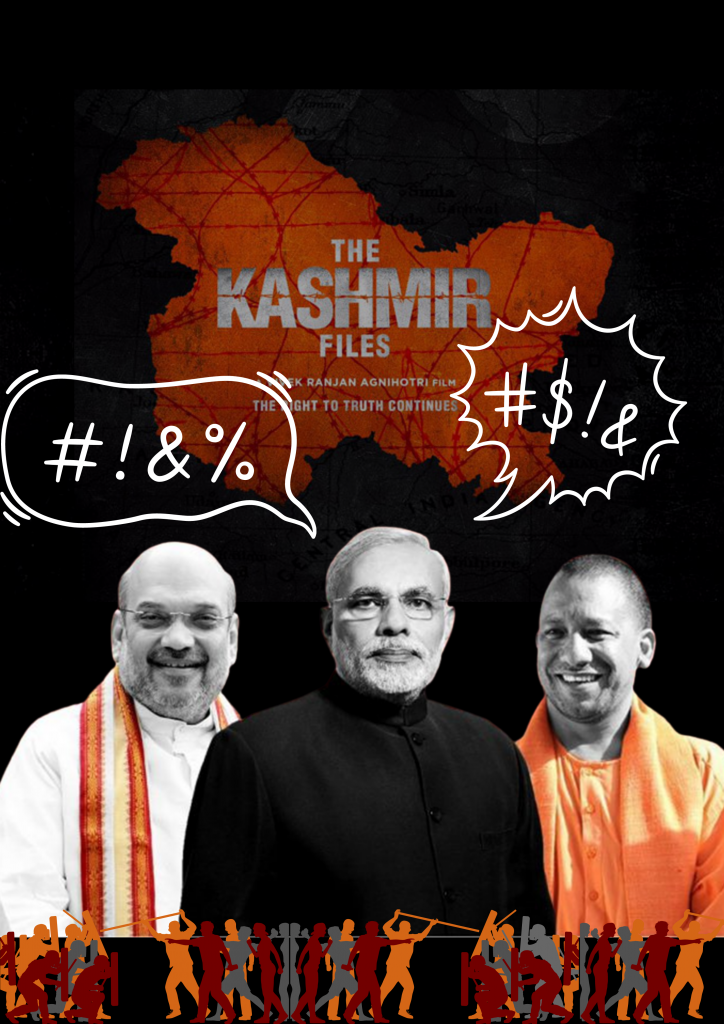
Kashmir, part of the administrative unit of Jammu and Kashmir, has been a disputed territory between Pakistan, India, and also China since the region’s independence from British colonialism. Tensions in the region have flared up through direct wars and military confrontations between especially India and Pakistan, acts of terrorism by secessionists, often state-funded as part of a proxy war, suppression of secessionist voices by the Indian state and civilian unrest during periods of particular repression. Since 1989, an estimated 40,000 people have been killed, an unknown amount of them civilians, and an estimated 8000 have been forcibly disappeared, many of them by Indian police and military that enjoys immunity in Kashmir.
What triggered the violent insurgency that recent movie The Kashmir Files claims to depict were the rigged elections of the state’s legislative assembly in 1988. With violence directed at anyone perceived to be supportive of the Indian government, pro-Indian politicians as well as Kashmiri Pandits, who at the time made up roughly 5 percent of the population in Kashmir, the insurgency triggered what is often called an “exodus” of Kashmiri Pandits in 1990.
Historical movies should strike a balance between choosing a perspective and showing the truth as it is, but this was not attempted by the makers of The Kashmir Files. Instead, this movie serves as a blueprint for the kind of historical revisionism that has been adopted by the Modi BJP government and Hindutva affiliates to coordinate radicalization and incite violence. It follows the exodus of Kashmiri Pandits, a group of Hindus living in Kashmir, exaggerating and twisting history while supplementing it with gory details that ideally suit the agenda of right-wing extremists in India to vilify and incite violence against Muslims, and to assert dominance over Kashmir.
In an interview, the director of The Kashmir Files expressed that he saw no need to adhere to historical facts, contradicted himself and cited figures, for instance regarding deaths, that have no basis or source. The result was a movie that distorts history in many ways.
Rather than trying to portray the complexity of the tragedy that occurred, the movie uses it to create more hate by portraying the events as a genocide against Hindus, when in reality the estimates of deaths lay around 300. Without any nuance, The Kashmir Files conflates all Muslims and radical groups, as well as different radical groups into one group. All Muslims are shown to be after Hindu lives, even children appear to carry only hate within them. No historical context is given to the violence taking place, and when connections to politicians or real events are made, this is solely done to blame liberals, leftists, universities or other perceived enemies of the people. This strategy of the far-right to create an otherness to show a specific group as “enemies of the people” is all too common, not just in India. Meanwhile, Kashmiri Pandits themselves have refuted the narrative of the movie and its vilification of Muslims.
In fact, various Indian newspapers have compared The Kashmir Files to Nazi Propaganda films such as Leni Riefenstahl’s Triumph of the Will. This is especially relevant as the RSS, the far right, Hindu supremacist organization of which India’s Prime Minister Modi is a member, was itself inspired by the Nazis themselves. Modi himself applauded the movie along with many other politicians, and state governments exempted The Kashmir Files screenings from taxation. Indian social media is full of cinema-goers chanting slogans against Muslims after watching the movie. The chants used are the same as the ones that could be heard during the Delhi riots, which led to 53 people being killed. Videos recorded after film screenings show calls for revenge, rape, ethnic cleansings and other genocidal acts, with comments supporting the agitation to fight for an India that is cleansed of other religions. Even Hindu children are instrumentalized in speeches at mass gatherings, claiming they should be equipped with weapons to kill Muslims.



The movie has emerged as key mobilization point for the Hindutva movement. Our research using CrowdTangle, Facebook’s internal monitoring tool, shows that a majority of overperforming posts in Hindutva Facebook groups concern The Kashmir Files. The vilification of Kashmiris that exists in the subtext of the movie explicitly comes to surface in these posts. After investigation by Indian journalists, it became clear that many of the men who seem behind the agitation of audiences themselves are affiliated with the RSS and other Hindu supremacist movements, and that their slogans are not spontaneous eruptions, but conscious efforts to radicalize cinema-goers.
Coincidentally, the movie, which in itself aims to shift the narrative around the history of Kashmir, was announced shortly after the Modi government revoked Article 370 in 2019, which gave Kashmir its special status. Following this, the region was shut down for 2 years, which led the international community to strongly condemn the human rights violations that have been commonplace in Kashmir for decades. The movie shows the Article as the reason behind the events that led to the exodus of Kashmiri Pandits, making its removal one of the main goals the main character Pushkar is fighting for. The movie thereby legitimizes the removal of Article 370 as a brave act of the Hindu Supremacist government to protect Kashmiri pandits. In reality, it is a part of the anti-Muslim politics of the last years, which aim at delegitimizing Muslims as part of Indian society and threatening the citizenship of millions of Indians who have lived in certain regions for generations. The narrative that the ruling party is pursuing is clear: India is a society of Hindus, and minorities are a threat that needs to be removed. The movie adds a cultural and emotional justification to these Islamophobic sentiments that helped the BJP rise to power and amplifies explicit calls to use violence.
It is because of the clear risk of further discrimination and violence against Kashmiris and Muslims that members of civil society have been campaigning for the movie to not be promoted and screened outside of India, as it will distort the views of people around the world on the immensely dangerous situation Indian minorities are in as well as radicalize the large Indian diaspora in across the world. Without any nuance, the tragic events of the exodus from Kashmir are retold in a way that paints all Muslims in India as inherently evil and bloodthirsty, constantly on the hunt for Pandits which are portrayed as victims in a one-sided conflict. Normalizing this portrayal around the world will help the Modi government to keep encroaching on minority rights without international repercussions and condemnation from the international community, and cinemas around the world need to stop screening The Kashmir Files to avoid being an accomplice to this.



